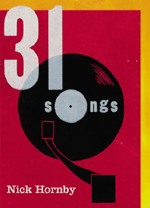Pop, Pop, Pop Music | |

| I approached Nick Hornby's 31 Songs with mixed feelings. I haven't liked any of Hornby's books except for High Fidelity (and I put that down to empathy with the lead character and his musical obsessions rather than the writing) and the majority of the 31 songs written about leave me cold. I mean, I like Nelly Furtado's single, but I wouldn't write about it or regard it as an all time favourite... I'd also read pretty mixed reviews in the newspapers, plus a vitriolic attack on it in Wire magazine's last editorial. It was this, along with finding out that in the USA Hornby has published the book with a small press run by a friend of a friend, that persuaded me I ought to read it. Rob Young's editorial rant is so patently stupid and angry that I felt I had to find out for myself; I was sure I could cope with Hornby's usual bluster and laddishness. Perhaps he'd even convince me of the worth of Bruce Springsteen, Teenage Fanclub or (heaven forbid) Rod Stewart? One of the things that Hornby immediately makes clear is that 31 Songs isn't a book about his favourite 31 songs, but simply about 31 songs that at some time or other have been important to him, even momentarily. This kind of lets him off the hook; it also means it isn't the kind of obsessive list that featured in High Fidelity or that Rob Young suggests it is. Neither is it a search for perfection, nor anything to do with record collector mentality [shrinkwrapped unplayed copies] - another charge Young levels at the author. In fact, as the book goes on, it becomes clear 31 Songs isn't really about music at all, but about what happens around music, what we do with music. How we hear things, how things get hooked in our brains, how pop songs can come to fleetingly mean something - love, rebellion, misery, joy - before we let go of them and move on. Regular readers probably know that this is actually why I never describe myself as a pop fan. I rarely feel a need to buy pop music when I know in a few weeks it will mean little to me, and that in the future it will be freely available to my ears on radios and in supermarket stores. I've learnt to enjoy music in this way, in passing and then sometimes nostalgically, but it isn't the music I collect and listen to. Of course, the transitory and fleeting can be interesting, and whilst I disagree with Hornby's choice of music that doesn't threaten or anger him anymore (Hornby states he doesn't need or want to listen to music like Suicide's 'Frankie Teardrop' any more, that life is too short to be challenged by music), I enjoy comparing his 'use', or version, of this track to my first hearing this track in a lonely house in the Outer Hebrides! Hornby may simply be better than me at letting go of the past, he doesn't feel the need to own the Suicide album I do, though we probably both listen to it the same amount (ie hardly at all). In fact one of the interesting things about getting older is I find I less and less need to listen to the music I love - a few seconds of a track and I can move on; I know it's contained and safe (mine, all mine) within the LP or CD rack. In a similar way, other tracks mean other things to Hornby: Patti Smith's 'Pissing in a River' is his rebellion song; Ian Dury, along with Richard and Linda Thompson, represent an 'Englishness' which intrigues; Teenage Fanclub are clearly his favourite band. A lot of Hornby's writing ends up not being about the music, but about what the music makes him think of, remember, or feel. And in the end it's that that is interesting, not his choice of music. Thankfully he hasn't really made a list, or tried to defend his choice of songs: these 31 songs are simply the way it is for Hornby, and he knows every reader would choose differently. This has allowed Hornby to make a small, witty and lively contribution to our understanding of human interaction with pop music. © 2003 Rupert Loydell |